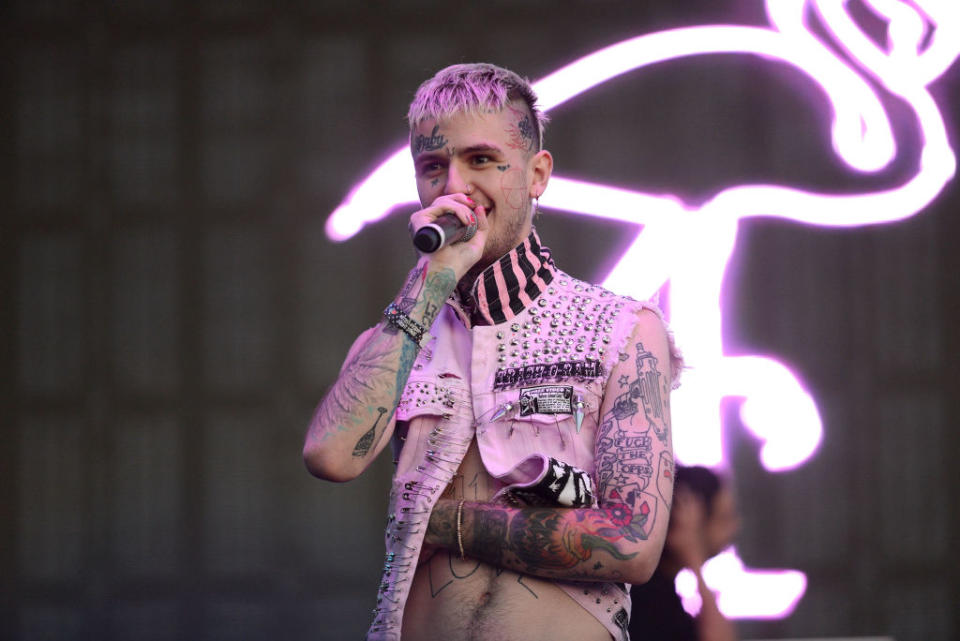Police Investigating Role of Powerful Opioid Fentanyl in Rapper Lil Peep's Death: Report
Police are looking into the possibility that fentanyl, an opioid pain medication, played a role in the death of 21-year-old rapper Lil Peep.
TMZ reports Tuscan law enforcement are investigating after they received tips that the musician may have overdosed by taking drugs laced with the powerful narcotic.
Fentanyl, an opioid used to treat severe pain, was found to have contributed to the accidental overdoses of Prince and Eric Chase Bolling Jr. Tuscan police have yet to respond to PEOPLE’s request for comment.

Peep (real name Gustav Åhr), who was a rising star in the hip-hop and emo scene, died earlier this month ahead of a scheduled show in Tucson, Arizona, due to a likely overdose on Xanax, according to Tucson Police.
However, his older brother Karl Åhr, who goes by Oskar, told PEOPLE exclusively that the pill Peep took may have been laced and caused his death accidentally.
“We [the family] have heard there was some sort of substance he did not expect to be involved in the substance he was taking,” Oskar, 23, said. “He thought he could take what he did, but he had been given something and he didn’t realize what it was.”
As to the possibility of it being an intentional overdose, Oskar said Peep “was not struggling” at the time and that finding out about his death was a complete shock.
“It was an accident, it really was an accident,” Oskar explained. “He was super happy with where he was in life.”
According to Oskar, Peep “had a much healthier relationship with drugs earlier in life” before his rap and hip-hop career started taking off.
“[Early on] he didn’t drink alcohol, for example,” Oskar explains, adding that his brother did use marijuana, though, starting at a young age. “I can guarantee [drugs are] not something that would’ve been a part of his life if he was not a part of that specific culture. Not only was he a part of it, he’ll be remembered for making waves in it.”
Oskar makes it clear that he and his family have great trust in Sarah Stennett, the CEO of First Access Entertainment, which partnered with Peep in the last year, but he blames the hip hop industry as a whole, in part, for putting pressure on artists to portray a certain image.
“My brother didn’t take five Xanax pills every day, but he would take them and then post on Instagram about it,” he says. “I wish it would have paid for him to be a little safer, but the world needed him to have superlative problems that he dealt with in superlative ways. Gus dealt with these problems much better than Lil Peep did, but people didn’t know Gus, and there’s a reason Gus doesn’t sell.”
Lil Peep was well-known for lyrics that openly addressed his use of drugs, specifically pills.
“I suffer from depression and some days I wake up and I’m like, ‘F—, I wish I didn’t wake up,’” he told Pitchfork in the interview published in January. “I don’t express that side of myself on social media. That’s the side of myself that I express through music. That’s my channel for letting all that s— out.”
In a video (since deleted) posted on his Instagram on the night before he died promoting his show in El Paso, Texas, the rapper said he had “six Xanax, and now it’s lit.”
He continued, “I’m good, I’m not sick. I’mma see you all tonight.”
In a video from earlier this month, Lil Peep tells his followers that he popped “perc 10s,” slang for highly addictive prescription painkiller Percocet.
He also had “Get Cake Die Young” tattooed along his hairline, and his Instagram bio read, “musician/supermodel/toyboy //ugly, cute and dying.”

